- Home
- Rose Tremain
Letter to Sister Benedicta Page 5
Letter to Sister Benedicta Read online
Page 5
“Then a day or two later, I rang up for an appointment with Mr Constad and that secretary said: ‘Oh no, I’m afraid Mr Constad is ill and won’t be available for some time. Can I suggest you see Mr Partridge?’ So I said again: ‘What is all this? Maybe I’m not Burt Lancaster, but I can pay!’ And all she’d say was, ‘Mr Constad’s been taken ill. He’s very ill and can’t see anyone.’”
Evelyn Wainwright’s eyes blinked faster and faster as she spoke. She tried her tea again, took a sip, then another and on the third sip looked up at me.
“I’m not explaining myself well, am I?” she said, “You see, since all this has happened, my nerves have been terrible. I know what it is now to suffer from nerves and I never thought I would because I never suffer from any kind of nervous complaint and now I can’t sleep or do anything properly because all I can think of is my home being sold under my feet, just taken away from me and I’m quite powerless. And your husband was the one man, you see, they told me might win my case – the one man. And now of course he’s ill and can’t help me and I know I won’t win with Partridge. Partridge is younger than my son!”
After a pause, during which Evelyn Wainwright drank the rest of the tea, I said: “I’d like to know more about it, Mrs Wainwright. Perhaps, if my husband recovers, he could do something for you . . .”
“Oh no. It’s quite wrong of me to have come. I didn’t know he was really ill, you see. I thought that was just a downright lie. He’s in the hospital then?”
“Yes. In a nursing home. He gets very good care.”
“And when will he be out, Mrs Constad? I keep asking them at his office, but they say they can’t say.”
“No, well, no one can say really. He’s had a very severe stroke. He just lies there and we all wait and wonder.”
“I’m sorry if he’s ill. I dare say there must be other people, solicitors I mean, who could help me win, but I was told your husband was the very best. They said he’d fight for me.”
“Well, I’m sure he would have done. Though he doesn’t win all his cases. He’s lost some quite important ones. I expect he would have tried to win yours. He always tries to win.”
“I need a fighter, you see Mrs Constad. Someone who can stand up and say there’s right on my side. Because I know there is. I mean, I’ve lived in my house for thirty-seven years. Thirty-seven years! And now Richard’s just taking it away from me and selling it. I walk by the estate agent’s window and there it is, For Sale – my house!”
“Well, if the house is yours, Mrs Wainwright . . .”
“It’s not mine, that’s just it; it’s Richard’s. I made it over to him years ago when my husband died so that when I die it will be his and he wouldn’t have to sell it to pay the duty. But I never dreamed he’d turn me out. It’s greed, that’s all it is, greed and debts. He just wants the money. He doesn’t care about the way I feel. And there’s nothing written down to say he can’t sell it. That’s why your husband didn’t want to take me on. He said ‘There’s nothing written down to say he can’t sell it.’”
“It does seem rather odd not to have written that down . . .” I began, but Evelyn Wainwright wouldn’t let me interrupt, she just wanted to go on.
“Family solicitors, you see,” she said, “when they drew up the document giving the house to Richard, they never dreamed that Richard wouldn’t let me stay on. There was a Clause 3 (they never should have been allowed to write that Clause 3, your husband said) and all they put down was that Richard should make provision – ‘adequate provision’ they wrote – for me if for any reason the house was sold. And I remember Richard laughed and said: ‘We’ll never sell the old house, we’re all much too fond of it and I don’t think Mother could live anywhere else.’ So I never dreamed, did I? And who would have dreamed that one’s own son . . .? And it’s only greed, that’s all it is, greed and debts. And I said: ‘Why don’t you sell your own house, Richard? Why don’t you go and live in a bungalow?’ But he won’t entertain the idea. ‘I’ve got a family,’ he says, ‘and we need a big place, whereas you, you don’t need a huge old house like that any more, do you Mother? You’re lost in it.’”
“It’s very large, is it Mrs Wainwright?”
“No, not at all, it’s a family house – five bedrooms. And I manage perfectly well and I love every room in it. And whatever will I do in a wretched bungalow with this ‘integral garage’ whatever that’s meant to mean? I mean, I’ve been to see it and if I live to be a hundred, I’ll never think of it as home. I never will. But I’m powerless, you see and do you think that’s right, Mrs Constad? Do you?”
I was trying hard to imagine Evelyn Wainwright’s house and her in it. I saw a lot of shabby things and moulting animals on rugs and I thought, she must have been lonely and neglected a long time to be so full of rage.
“I don’t know,” I said, “I’ve never been very good at judging things. I often get everything quite wrong. But I dare say when it comes to court, you’ll be allowed to stay on. Judges don’t like young men selling things off, they have a hatred for this, in fact.”
“How do you know this, I mean, when there’s no clause to say he mustn’t sell?”
“I used to go to court quite a lot. It used to interest me. And I got to know quite a bit about the ways of judges. There are no young judges, you see. They’re all old. They make all the noises of old people, squeaks and wheezes and farts, which can be quite distracting in the middle of an important trial. They never notice their old-men’s noises, but everyone else does and really it’s enough to make you lose faith in them. But what I can tell you is that they hate the idea of anyone selling anything off. It’s as if they saw their gowns being sold next and their wigs and their latchkeys to rooms in the Middle Temple.”
Evelyn Wainwright looked at me as if I was mad. I realized that I was smiling and that my smile was inappropriate. I took it off my face (it seemed a long, long time since a smile had been there) and offered Evelyn Wainwright some more tea. She shook her head.
“No, I can’t stay any longer,” she said, “and I wouldn’t have bothered you if I had known your husband really was ill. Perhaps when you go to see him – unless he doesn’t want to be bothered with work – you could remind him about my case and tell him I’m refusing to see Partridge and then when he comes out of hospital, he might be able to give me some time. I mean, I may not be Burt Lancaster, but . . .”
I thought, if you could see Leon, Evelyn Wainwright, see him the way he is now. “Your case is on his mind,” I said curtly.
“Is it? Well, if it’s on his mind, he’ll take me on won’t he? He’ll fight for me?”
“He might die.”
“Oh no! He couldn’t die, could he? I mean what a waste! A man who can fight like him and people need other people to fight for them, don’t they?”
“Sometimes, perhaps.”
“He won’t die, will he?”
“I don’t know.”
“Oh, he mustn’t die.”
“I’ll show you out, shall I?”
“Yes. I looked you up in the telephone book, you see. That’s how I found you. I thought, Mr Constad is so well protected he won’t be in the telephone directory but there he was. I was very surprised. I didn’t think, with his reputation and protection he’d be in the book.”
When we were at the door, I thought suddenly, I never want to see her again and I said: “Please don’t wait for Leon, will you? Please go and see Partridge. Partridge will help you.”
“He won’t, Mrs Constad. He won’t. I need the best and I’ll wait and Richard will have to pay the costs, the judge will see to that.”
And then she was gone, the lift swallowing her and I thought of her driving back to her home and putting out dog food in old plastic bowls and birdseed in little trays. I don’t know why I imagined her with pets; I believe she must have smelt of animal fur and faded blankets and I found her repulsive. I couldn’t feel sad for her, though I tried. I sympathized with the son Richard who wanted th
e old home gone and his mother out of the way and safe in a centrally heated bungalow with shiny floors.
But why is her case on Leon’s mind? Does Leon remember her and her rage? Or is there nothing of her at all inside him, only the disembodied phrase “the aforementioned Richard Mayhew Wainwright” which he may not even recognize as a name, just as a kind of pattern his mind keeps making? I think what I must do this afternoon is to tell him that Evelyn Wainwright has been here to see me and watch him closely for any sign that this information is helpful to him.
It occurs to me that he might be feeling guilty about this case, which doesn’t seem to bear much resemblance to his others, which are all very brightly coloured and this is rather a faded one and for this reason wouldn’t have appealed to him and he may even have sat there saying to himself, “I wish this poor washed-out woman was Burt Lancaster.” Or perhaps it was this case that made him understand at last that often the law is quite rigid and arbitrary like a bad headmaster who thinks that he sets to rights everything that is wrong in the school. Perhaps he at last noticed that the law only solves half of what it thinks it solves and that in some cases it is quite fumbling and inappropriate and what is needed is something else. In his long silence, perhaps Leon is determining what the “something else” is and may reveal it one day, when he’s discovered it. But I have my doubts. Leon has always had such faith in the law and all the thousand ringings of his green telephone and his red telephone and his white telephone have never made him lose that faith, and as far as anyone can tell, it must be with him still.
When Noel was born, Leon came into the ward and took the baby out of my arms, held it up and looked at it very closely and then said a strange thing. He said: “I see myself,” as if the red-faced baby was a mirror and I laughed. But Leon was serious. All through Noel’s life, he has wanted the boy to be like him. It was Leon’s idea – and once this was in his head, it wouldn’t come out of it – to call the baby Noel, his own name spelt backwards. And he kept on looking at Noel, trying to see himself take shape in him. “My son is very like me!” he so often announces to people who’ve never met Noel and then I always think, there he goes again with that old twaddle, because Noel isn’t really at all like Leon and I don’t think he ever will be. He doesn’t look a bit like Leon, for a start, but resembles my mother and all her rather tall relatives who were narrow-boned, straight-haired and freckled. There’s not a freckle on Leon’s body. And Noel is a loud person, clumsy, too big for the room; he’s inherited nothing of Leon’s neatness and sharp efficiency.
I don’t know why Leon has always wanted Noel to be like him. It sounds very like conceit, but I know it isn’t this – it’s far too desperate a hope. I once asked Grandma Constad if she understood why Leon clung to this hope, but all she said was: “Sons, oh my Lord, and sons of sons!” which revealed to me only that she didn’t know, just as she didn’t seem to know about a great many things in the world such as where the Pope lived (she though it was Dublin) and why the seats on London buses weren’t wider. “I only know about being poor. That’s all I know about,” she once announced to me. But she said this long after she was rich and Leon had bought her a house in Chelsea, and whenever I think about her now, I have to conclude that she was rather a stupid woman and only said meaningless things like “Sons, oh my Lord!” to fill up all the blanks in her mind.
I discovered that talking to Evelyn Wainwright had made me tired. I’m not used to talking to anyone. I say my monologues in Leon’s room with the nurses coming and going, but there I can stop talking whenever I like and I never have to listen to anyone else because Leon is mute. I think the listening tired me. I found that after I had wondered a little about the Wainwright case, and its place in Leon’s subconscious, I felt a terrible weariness seeping into me, as if my blood was flowing so slowly it could hardly get round me, and I didn’t know what to do with my body except lie it down.
One of the painters on his trolley was painting my bedroom window. He is Irish and the cheeriest of painters and I long for him to say “top o’ the mornin’”, only he never does and I really can’t blame him because the mornings are all cold and grey as sorrow. I waved to him and he gave me a kind of salute with his brush and then I caught a brief glimpse of his startled eye as I drew the bedroom curtains and shut him out. It was lunchtime, but I wasn’t hungry and I knew that unless I could rest for a while, I wouldn’t get to the nursing home in the afternoon.
I didn’t get to the nursing home. I dreamed away the whole afternoon, not waking when it got dark, sleeping an exhausted, dream-filled sleep.
I was on my train again going towards Norfolk, but this time the snow had fallen so thickly, drifted so dangerously, that the train had to keep stopping. There were great mountains of snow on the line that had to be shovelled away before the train could go on. Men came up with shovels. The men were dressed like the navvies who broke their backs building the Stockton and Darlington in the 1820s, and I thought with all the muscle and strength in them they would clear the snow in no time and we could go on. But I leant out of my carriage window and I could see the mountain of snow and the men with shovels and I knew that they were working dreadfully slowly, taking their time, not caring whether the train moved off or whether it sat on that lonely bit of Eastern Region line until nightfall – until daybreak. I climbed out of the train and I was ankle-deep in the snow on the side of the track. I walked to where the navvies were shovelling away the snow mountain and I said: “Tell me where the blind man is with his stick. He knows where the pub is, and if I can just get to the pub, then someone there will tell me where I am.” The navvies shook their heads and looked at each other and then back at me, as if they hadn’t understood a word I’d said. I asked them again, pleaded with them, “tell me where the blind man is”, but they stared at me now like people stare at lunatics and one of them gestured towards the great expanse of snow-covered plough that stretched away to my right towards the great weight of the sky and I looked in vain for a road, the road where I’d first met the blind man, but there was no road.
I noticed then that from all the carriage windows, people were staring at me. Along the whole length of the train they were staring and gaping, so that I became afraid of them and afraid to get back into the train and I wandered off across the white furrowed field. The furrows were as hard as granite, so that with each stride my ankles gave and my feet twisted and it was an agony to go on.
I walked until the train was almost out of sight. I looked back at it, immobile in the snowscape, and felt suddenly glad, proud of myself that I had abandoned the train and gone my own way. It was getting quite dark in a moonless afternoon, but ahead of me now I could see a light. I was glad to be following a light, thinking to myself the light is the pub and it will be warm in there and the landlord will say: “There’s not a field for miles around that I don’t know like the back of my hand, nor a house for that matter,” and the great grey expanse of the dark Norfolk day will be tamed by this one man’s knowledge of it. But then I knew that the light wasn’t the pub; the light was Alexandra’s cottage. I had found it quite by chance, by stumbling off the train and over the plough. I was within fifty yards of it and I thought, now at last I shall see.
When I reached the cottage, I didn’t know whether to knock at the back door or the front. I waited at the back door and listened. There wasn’t a sound. I knocked feebly and then noticed that the door was ajar. I crept in.
I found myself in a small kitchen. The light was on, but the room was empty. There were crayons and paints all over the kitchen table. On a very old cooker, there was a pan of boiling water with one egg in it. The bubbling egg was the only sound.
I was very cold and I wanted to find the room with the log fire. So I walked out of the kitchen into a passage. The passage was dark, but I felt my way along it to a heavy door that opened with a Suffolk latch. I could see a light behind the door and I thought, now I have found Alexandra.
I was in the room. The room was smal
l and untidy and smelt of paint. There was a fire in it, but the fire had burned low and no warmth from it reached me because there was a girl kneeling in front of it. I knew that the girl was Sue. I said: “Sue, I’ve come across all the fields from the train. I dared to get off the train and follow the navvy’s pointing hand, so don’t tell me that it was all in vain.” Sue turned round and stared at me, but said nothing, only stared. So I said again: “Sue, don’t tell me that Alexandra isn’t here. I’ve come here to be with you both and I promise not to disturb the hens and all I want is to understand. Please don’t tell me to go away.”
Sue still said nothing, but turned back to the fire. And it was then that I remembered I had brought a paraffin heater with me on the train and had left it there when I clambered down into the snow. I understood then that Sue would only talk to me if I went back and fetched the heater. I had come empty-handed and she scorned me and would tell me nothing until I had gone back to the train and fetched my gift for the cottage. Yet at the same time, I also knew that the mountain of snow on the line had been shovelled away by now and the navvies had gone home to their tea and the train had rushed on into the darkness towards the sea and the paraffin heater was lost.
“I could go . . .” I began to say, “but how could I ever catch the train. Even if I ran and ran, I could never catch the train. . . .”
It was five o’clock and London was noisy outside the closed curtains. I went to the bathroom and said a prayer. “Oh God,” I said, “I’m afraid.”

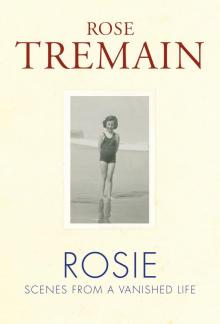 Rosie
Rosie The Garden of the Villa Mollini
The Garden of the Villa Mollini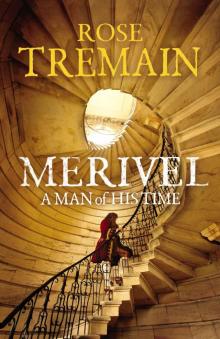 Merivel: A Man of His Time
Merivel: A Man of His Time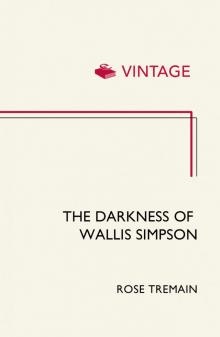 The Darkness of Wallis Simpson
The Darkness of Wallis Simpson Earth
Earth Sacred Country
Sacred Country The Swimming Pool Season
The Swimming Pool Season The Gustav Sonata
The Gustav Sonata Sadler's Birthday
Sadler's Birthday The Cupboard
The Cupboard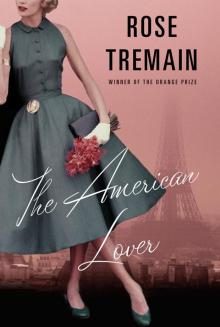 The American Lover
The American Lover Letter to Sister Benedicta
Letter to Sister Benedicta Evangelista's Fan
Evangelista's Fan Restoration
Restoration The Road Home
The Road Home The Colonel's Daughter
The Colonel's Daughter The Way I Found Her
The Way I Found Her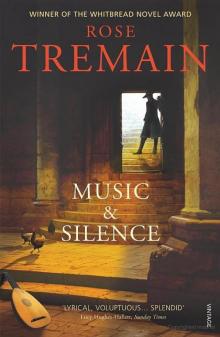 Music & Silence
Music & Silence